

The Labyrinth of Lost and Found











The Labyrinth of Lost and Found



















UK | USA | Canada | Ireland | Australia India | New Zealand | South Africa
Puffin Books is part of the Penguin Random House group of companies whose addresses can be found at global.penguinrandomhouse.com. www.penguin.co.uk www.puffin.co.uk www.ladybird.co.uk
First published 2024 This edition published 2025 001
Text copyright © Jordan Lees 2024
The Whisperwicks: The Impossible Trials extract copyright © Jordan Lees, 2025 Illustrations copyright © Vivienne To 2024
The moral right of the author and illustrator has been asserted
Penguin Random House values and supports copyright. Copyright fuels creativity, encourages diverse voices, promotes freedom of expression and supports a vibrant culture. Thank you for purchasing an authorized edition of this book and for respecting intellectual property laws by not reproducing, scanning or distributing any part of it by any means without permission. You are supporting authors and enabling Penguin Random House to continue to publish books for everyone. No part of this book may be used or reproduced in any manner for the purpose of training artificial intelligence technologies or systems. In accordance with Article 4(3) of the DSM Directive 2019/790, Penguin Random House expressly reserves this work from the text and data mining exception.
Set in 10.56/17.60pt Monticello LT Pro Typeset by Jouve (UK), Milton Keynes Printed and bound in Great Britain by Clays Ltd, Elcograf S.p.A.
The authorized representative in the EEA is Penguin Random House Ireland, Morrison Chambers, 32 Nassau Street, Dublin D02 YH 68
A CIP catalogue record for this book is available from the British Library
ISBN : 978–0–241–60750–3
All correspondence to:
Puffin Books
Penguin Random House Children’s One Embassy Gardens, 8 Viaduct Gardens, London SW 11 7BW
Penguin Random Hous e is committed to a sustainable future for our business, our readers and our planet. is book is made from Forest Stewardship Council® certified paper.
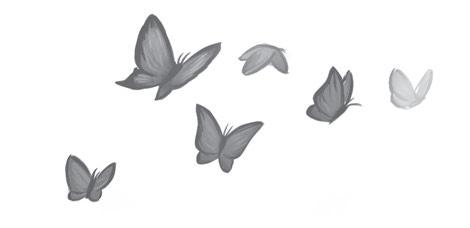





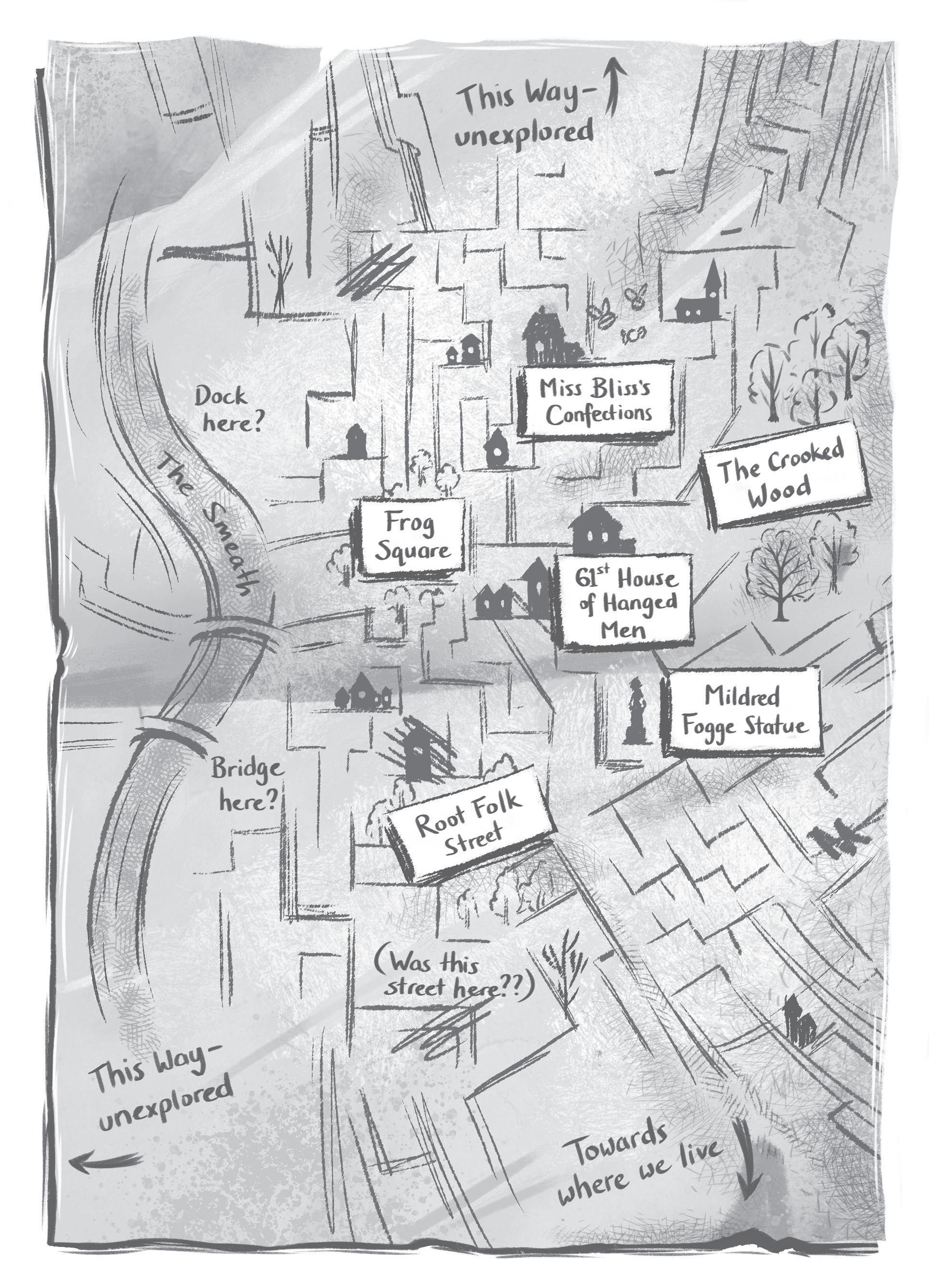

The dollmaker will come when a baby is born.
Into a room she will take the newborn; nobody else, not even a parent, is permitted to be present.
Candles will be lit, which smell sweet and wild and other-worldly. Listening at the door, one will hear the dollmaker whisper her strange, trembling words. It is said, in making the doll, that the dollmaker is fashioning the child’s soul.

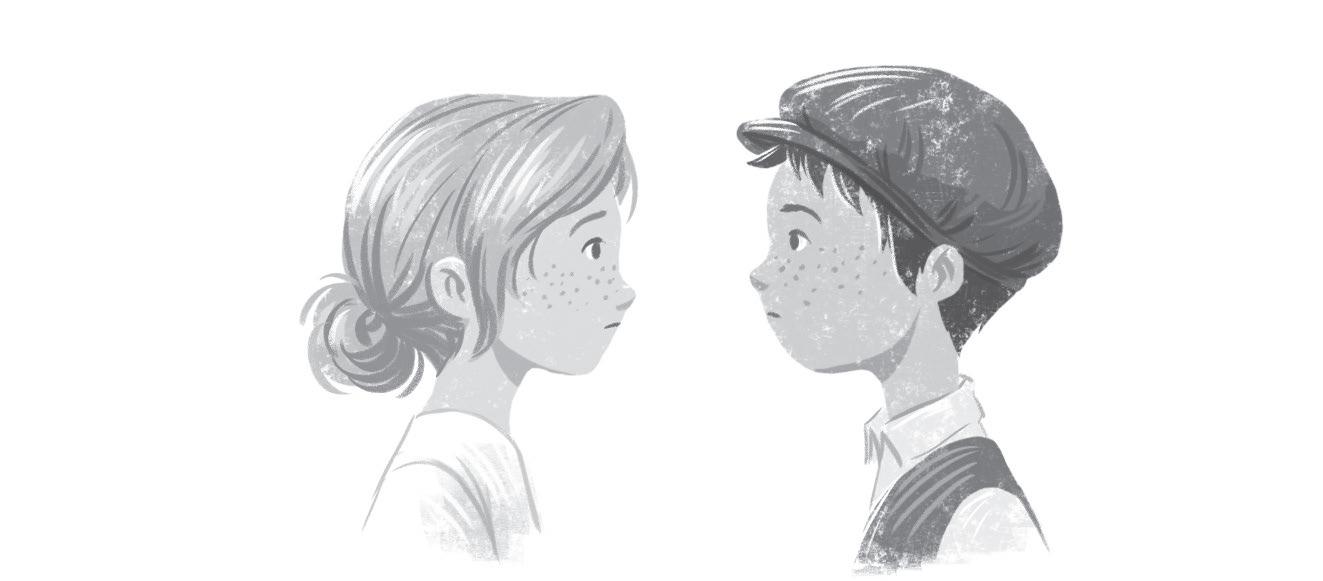

It began with the crack in the wall.
Edwid Cotton found it one morning on his bedroom wall. It was around thirty centimetres long, a thin black smile in the pale stone. It must have happened sometime in the night, though exactly how was a mystery to Edwid.
There was something instantly sinister about this crack in the wall. Peering in, Edwid saw only darkness, as though the wall were hollow. Cold air threaded out, smelling of dust. Stranger still, he was sure he could hear the faintest whispering from within. A shivering Edwid dismissed this as a figment of his imagination.
Certain Hansel would blame him, Edwid decided to cover it up – he was already in his father’s bad books and didn’t
want to make things worse. Parchment sketches of famous Mapmakers covered the walls, so it was straightforward enough to move one over and hide the crack. The moment it was covered, the room felt warmer, Edwid’s mood lifted, and any thought of whispering from within the wall was put down to childish fancy.
Nothing much happened that day or during the night that followed. Edwid slept serenely, dreaming of the adventures he hoped to have in the future.
When he woke the next morning, the crack in the wall had returned.
The covering sketch was torn across the middle, and through it the crack could be seen again. Whorls and curls of parchment had fallen to the floor. And Edwid heard that same whispering once more, faint and menacing, joined by a trickle of wispy laughter. He leaned in and listened.
‘What did you say?’ he hissed, bringing his ear to the crack. But all he heard was a tangle of whispers, a snakepit of hushed voices.
‘What?’ he whispered.
‘Who are you talking to?’ demanded another voice.
Edwid reeled. Elizabella, his twin sister, stood in the doorway, hands on hips and eyes narrowed. Each was mirrored in the other: the pale hair, the round face, the sharp
nose spattered with freckles. They were the same height, with the same wiry build. They even moved in the same way, darting here and there like foxes up to no good.
‘Nobody,’ said Edwid, crossing his arms.
He leaned against the wall, covering the crack. Elizabella’s stare grew flintier.
Not long ago, he would have told his sister about the crack in the wall. They would have investigated it together, worked up theories, laughed and bickered and created a shared story with the mysterious crack at its centre. That was how they had always been – like a child and its reflection, down to the last freckle.
Things were different now. A distance had grown between them. And Edwid was to blame.
Pain flickered across Elizabella’s face. Edwid felt it, too, but neither voiced it. Elizabella shrugged, then strutted off. Moments later, her bedroom door slammed.
Flooded with a familiar sadness, Edwid returned to the crack in the wall.
‘Now look what you’ve done,’ he said quietly. ‘She already hates me.’
Whispers chattered like crickets in long grass.
‘One at a time,’ said Edwid.
Remarkably, one voice did rise above the others.



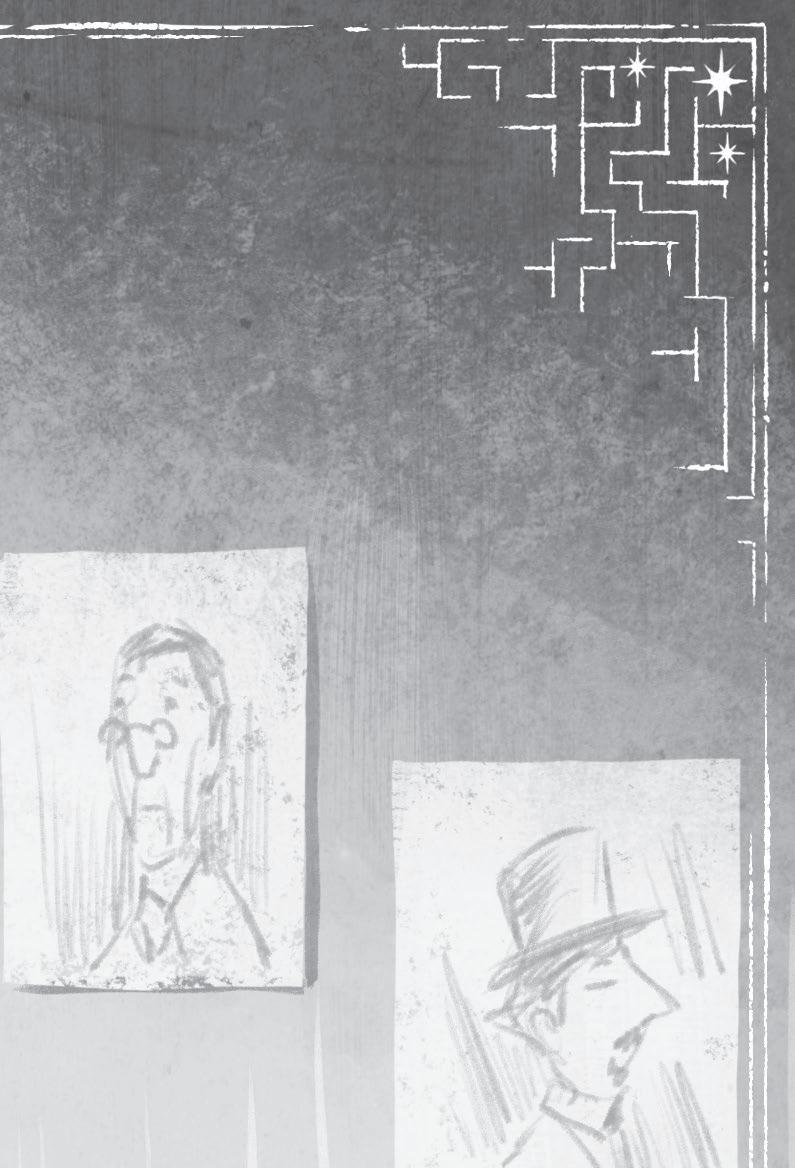
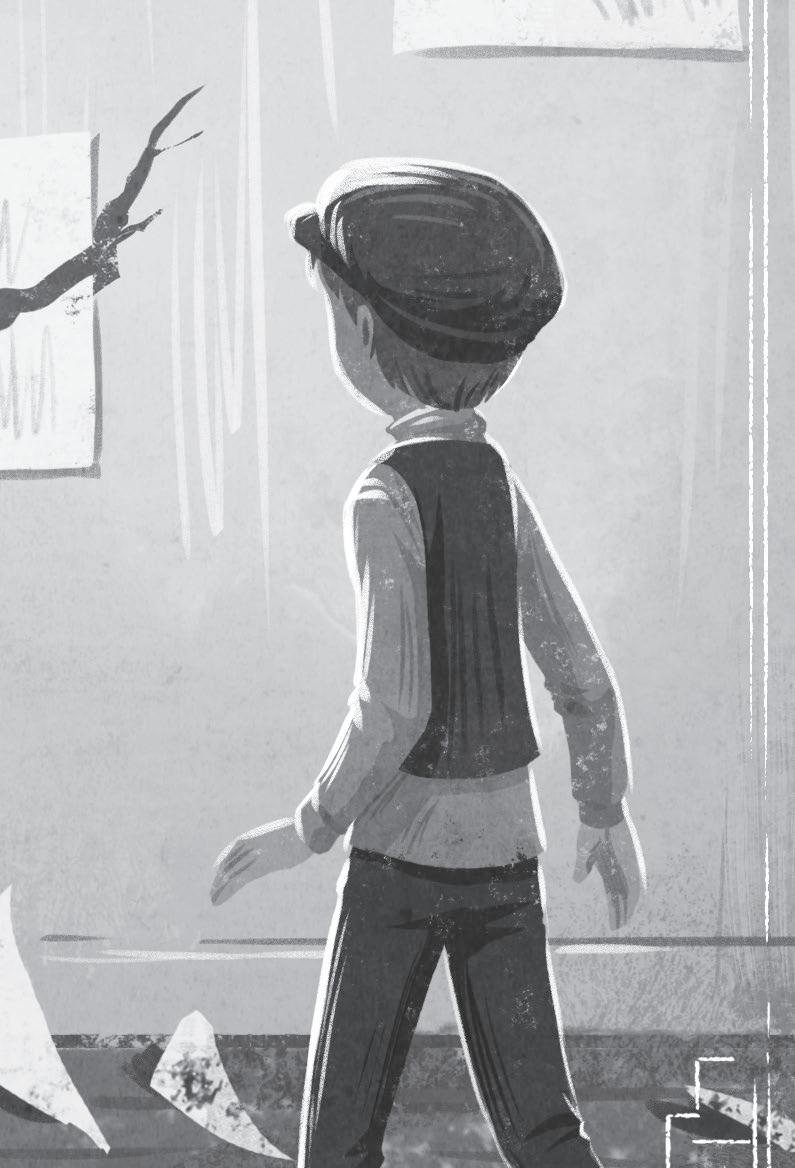

‘It’s your own fault,’ it said.
Edwid fl inched, recoiling from the wall. His heart galloped. Gradually, he found the courage to lean forward again.
‘Who are you?’ he asked.
‘Nobody,’ said the whisper.
‘Everybody is somebody,’ replied Edwid.
‘I was somebody,’ said the voice. ‘Then I was trapped here, forced to live forever in the walls of Wreathenwold. Never sleeping, never eating. Unable to die, but unable to escape. That makes me nobody.’
‘You don’t sound like a nobody,’ said Edwid.
‘You’re very kind.’
‘It must be terrible,’ whispered Edwid. ‘Is there anything I can do?’
‘I knew you were a good boy, Edwid,’ said the voice.
‘That’s why I like being here, in your bedroom wall. There might be a way to get me out. But I wouldn’t want you to put yourself in danger for an old nobody like me. No, better to leave me here.’
‘I want to help,’ said Edwid.
‘You would really do that for me?’ said the whisper.
‘Why not?’
‘I couldn’t possibly let you.’
A minute or two passed in which Edwid argued with the crack in the wall, until finally it was persuaded to accept his help. A tiny sob marked the end of the debate.
‘You’re a good boy, Edwid Cotton,’ said the voice. ‘Do you know of Olfred Wicker?’
Edwid did. Olfred Wicker was a children’s author who wrote the Jamima Cleaves books. Jamima was a twelve-yearold detective who solved magical mysteries with the help of her poppet doll, and the books were some of the most popular in Wreathenwold. Elizabella loved them. Edwid once did, too – it was another thing he and Elizabella used to share that now seemed lost.
‘Well, it was Olfred Wicker who put me here,’ said the voice.
Edwid was stunned. He asked why.
‘It saddens me to tell you this,’ said the crack in the wall, ‘but Olfred Wicker is the most miserable fraud. He stole every one of his plots for the Jamima Cleaves books from somebody else. And, after he steals somebody’s ideas, he throws that somebody inside the walls of Wreathenwold so they never expose him. From me, would you believe, he stole the ideas for Jamima Cleaves and the Circus of Hidden Souls and Jamima Cleaves and the Killer Effigy. Then he locked me in here so nobody would ever know.’
‘But that’s ridiculous,’ said Edwid.
‘I knew you wouldn’t believe it,’ said the crack in the wall, sounding morose. ‘Nobody would. That’s what I said to the rogue as he bundled me into this wretched prison, but he didn’t listen.’
It was a wild story, but Edwid thought the voice in the wall sounded very honest. Why would it lie about a thing like this, in any case?
‘How can I help?’ he asked.
‘Well, you’d need to go to Olfred Wicker’s house.’
‘What am I looking for?’ said Edwid.
‘The key to release me,’ said the whisper. ‘I’ll meet you there and together we can find it.’
Unsure precisely how a crack in the wall could travel, let alone meet anybody anywhere, Edwid prepared his things. Into his satchel went a small cracked spyglass, his battered notebook of erroneous maps, the last of his pocket money. He also packed a change of clothes, his favourite moth-eaten flat cap and a spinning top, a Midsommer gift from Elizabella – to remind him of home, of his father, Hansel, and particularly Elizabella, his best friend.
Getting away was going to be the biggest challenge. Hansel was keeping a very close eye on Edwid. Fortunately, Hansel also had a soft spot for drinking poppysyrup in the
snug after Edwid and Elizabella were in bed. Poppysyrup, strictly for adults, was a clear liquid that smoked when poured and had scorched the twins’ nostrils when they once took a sniff. By the third glass, Hansel tended to fall asleep by the fire, which would be Edwid’s best chance.
The real problem was Elizabella. She was more vigilant and considerably smarter than both Hansel and Edwid. Elizabella watched Edwid from a distance, out of the corner of her eye, mistrustful and hawkish, tracking him while busying herself with other things. However careful Edwid had to be with Hansel, he’d need to be twice as wary around Elizabella.
Night came, and Edwid pretended to go to bed. Soon after, he heard Elizabella blow out her oil lamp through the adjoining wall. An hour later, Hansel ambled along the hallway and creaked Edwid’s door open. Satisfied his son was asleep, Hansel likewise checked on Elizabella before shuffling back along the hall, gathering his poppysyrup and tumbler and settling in the snug.
Edwid waited patiently. The house was silent. Finally, after what felt like an age, the signal came: Hansel’s first snore. Quietly, Edwid dressed, grabbed his satchel, tied his doll to his hip and snuck through the house. He made it all the way to the front door.
‘Where do you think you’re going?’
Edwid spun. Elizabella was standing there, hands balled and eyes glaring from the shadows.
‘Go back to bed,’ said Edwid.
‘Where are you going?’ demanded Elizabella.
‘There’s something I need to do,’ said Edwid. ‘Go back to bed. I’ll be home soon, I promise.’
‘I’m coming with you.’
‘No.’
‘I’m calling Hansel, then.’
‘We never tell on each other,’ said Edwid. ‘That’s the deal.’
‘I made that deal with the old Edwid,’ said Elizabella.
Her words struck Edwid in the stomach. He turned to leave.
‘Why do you hate me now?’ said Elizabella, her voice as small as he’d ever heard it. ‘What have I done?’
‘You haven’t done anything,’ said Edwid, feeling an ache in his chest.
‘Then why are you keeping secrets from me? We’ve never kept secrets.’
‘I’ll tell you everything when I get back,’ said Edwid. ‘I promise.’ And he meant it.
‘I won’t let you go,’ said Elizabella.
She took a step forward, her hand drifting to her hip where her doll hung. A threat. Instinctively, Edwid’s hand moved to
his own poppet. The twins stood this way for a moment, like statues in the shadows, on the verge of a battle with their dolls that would almost certainly wake Hansel and that Edwid would most likely lose.
Keeping his eyes on Elizabella, Edwid took a step backwards. And another. Then, never lifting his gaze from her, he opened the front door and backed out. Elizabella only moved at the very last moment – not to pluck her doll from her hip, but to brush something from her eye.

Olfred Wicker lived in a little cottage at the end of a lane of other squat stone cottages. Smoke twisted from their chimneys, lamps glowing warmly behind the curtains. Wraithlike fl owers of white and black bloomed from the fl ower beds.
Olfred’s cottage was different: dilapidated and lopsided. A great bonewood tree rose from the overgrown garden, its ghostly white branches sprawled across the thatch. No warm lights smouldered within, no smoke twining dreamily from the chimney. All was darkness, every window boarded up.
Nervously, Edwid navigated the wilderness of Olfred’s front garden and knocked on the door. No one came – nor was
there the slightest sound from within. It seemed that nobody lived here. Had Edwid been tricked?
Then there was a cracking sound. A tiny fissure streaked across the stone wall of the cottage until it was thirty centimetres long, suspended in a black smile. The crack looked the same as it had on Edwid’s bedroom wall.
‘He’s inside,’ whispered the familiar voice.
‘Doesn’t seem like it,’ said Edwid.
‘He is,’ said the voice. ‘He wants to be left alone. Wants to make sure nobody ever finds the key to release his prisoners, who will expose him as a fraud.’
Edwid didn’t like how this was beginning to feel. Something tugged in his stomach, a doubt or suspicion that all was not as it seemed. Dark and cold, Olfred’s cottage gave him the shivers. He should have stayed home with Elizabella. If he’d told her about the crack in the wall, she’d have made him see sense.
‘We can’t even get inside,’ he said.
At that, the crack in the wall grew, spearing across the stone in a trail of puffing dust until it reached the front door. There it spread, a spiderweb of ruptures, throwing out splinters of wood until an entire panel fell away. It was just large enough for Edwid to crawl through.
He took a deep, thoughtful breath. Behind him was home, Hansel, Elizabella; in front was this creepy cottage, uncertainty, the possibility of danger.
Another deep breath and Edwid clambered through.
Inside, it was deathly quiet, the air stale. A tap dripped in the nearby kitchen. Books were crammed, stacked and piled everywhere. On the wall were paintings of scenes from the Jamima Cleaves books, many of which Edwid recognized: Jamima chasing down the culprit at the end of Jamima Cleaves and the Tongue Thief, Jamima and her poppet fighting the villain in Jamima Cleaves and the Moonlit Killer. Had Olfred really stolen all his ideas from other people?
Edwid crept onwards, and the crack in the wall joined him, snaking along the cottage wall, spouting flakes of stone and timber as it went.
‘Where is the key?’ Edwid whispered.
‘Through there,’ said the crack in the wall. It must have meant straight ahead, where weak candlelight splashed upon the length of the door frame.
‘If Olfred’s in there, he’ll catch us!’ said Edwid.
‘Who’s that?’ came a sudden shout from beyond the door.
Edwid froze, heart thundering in his ears.
‘Stay away from me!’ cried Olfred Wicker. ‘Leave at once!’
‘He knows we’re on to him,’ said the crack in the wall. ‘Go on, Edwid – the key!’
Compelled by some terrible curiosity, Edwid edged forward and pushed the door open. Beyond was a cramped study, a ceiling lined with bonewood timbers, and teetering towers of books in every direction.
In a rickety chair in the corner was a very old man, tiny and hunchbacked and filmed with candlelight. Upon seeing Edwid, his eyes stretched with terror. He scrambled backwards in his chair, crouching like a frightened child. One of his liverspotted hands flew up and clamped over his mouth.
‘Who are you?’ said Olfred, through his fingers.
His voice was a cobweb, his face a maze of wrinkles. Wisps of white hair were gathered round his ears – otherwise he was bald. On the desk beside him was a typewriter and a stack of paper. He trembled as though Edwid were the most terrifying thing he’d ever seen.
‘I’m sorry,’ mumbled Edwid. ‘I just . . .’
‘Please,’ said Olfred. ‘You have to leave, young fellow. Nobody can be here!’
The crack in the wall lashed across the ceiling like a tail of black lightning, sending down a cascade of dust and wood. Olfred saw it with horror, shrinking further into his chair.
‘No . . .’ he muttered. ‘No, no . . .’
‘Get it,’ ordered the crack in the ceiling. ‘Now’s our chance!’
‘But where is it?’ called Edwid, not seeing a key anywhere.
‘Boy, don’t you know what that thing is?’ groaned Olfred, eyes fixed on the crack. ‘Don’t you know what it wants . . . ?’
Edwid shook his head, mind swirling. What he would give to be back at home.
‘Go to him, Edwid,’ said the crack in the ceiling. ‘He will tell you where the key is.’
Terrified, Edwid approached. Olfred trembled and cowered until their eyes met. The old man’s were watery and bloodshot, awash with terror. Then another expression overtook his face. Now he just looked immensely sad, resigned to defeat.
‘I’m so sorry, young fellow,’ he croaked. Then he leaned forward and whispered into Edwid’s ear. The moment he finished, the old man leaned back, shut his eyes and died right there in his chair.
Edwid fell backwards. His ear throbbed with the horror of what Olfred had whispered to him. The crack in the ceiling had fooled him. And it was something very different to what it had told Edwid.
Edwid groaned, head spinning, as he looked up at the crack in the ceiling.
‘What did he say, Edwid?’
The voice had grown fiercer, as sharp and deadly as a knife. A nasty splitting sound rang out as the crack shot across the ceiling and struck a lightning-shaped fissure down the length of the wall. Cold air spilled out, and Edwid stumbled backwards.
‘Tell me what he said, Edwid.’
Just then, something silvery appeared in the crack, bewitching Edwid. It was a tiny curl, like a new moon suspended in the night sky. Edwid stared and stared, frozen in place. When it momentarily vanished, only to quickly return, he understood what he was seeing.
It was an eye.
‘Tell me what he said, Edwid. And then it will all be over.’
Edwid shook his head, staggering backwards. Again the eye blinked.
Then came a tremendous cracking sound, and the wall ruptured, fissures striking outwards like an earthquake. Dust and stone plumed, icy air flooding out. Amid the fog was a dark, terrible shape, hurtling out and descending upon Edwid in a storm of shadow and smoke.
Edwid’s final thought was of Elizabella, of how sorry he was not to have told her everything. Then he ran.

Folklore has long held of another world woven throughout our own. Between our world and this other one – according to the folklore – have travelled poets, scholars, adventurers, fugitives and even, on occasion, unlikely heroes.

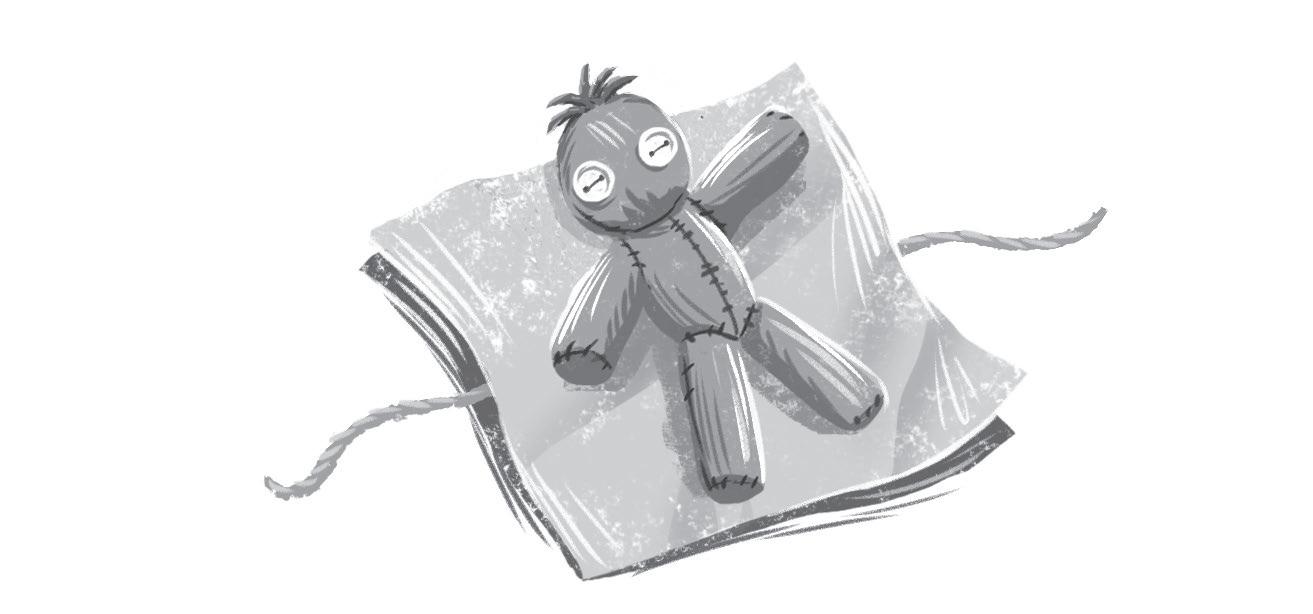




Nothing remarkable or stirring ever visited the sleepy village of Wyvern-on-the-Water. Excitement would instead visit the nearby town of Bramleigh or the cobbled, mossy village of Hatchet, which boasted a history of notorious pirates and famous sieges. As for Wyvern-on-the-Water, only its name was interesting, derived from the legend of an Arthurian dragon said to sleep beneath one of the heathery hills overlooking the river. It had never bothered to wake.
Picture a steepled church with primly tolling bells. Picture Sunday fetes with coconut shies and bake sales. Picture sailing boats, children mudlarking at low tide, an underwhelmed heron picking through the shallows. That was Wyvern-onthe-Water. It was all stout, orderly cottages and narrow lanes
that speared and twisted according to no real logic. Hawthorns and cherry blossoms would paper the streets with white and pink petals in the spring. Summer would see blackberries fatten on the trails along the river. There were three tearooms, two pubs, a newsagent’s, a hairdresser’s, a library, two bric-abrac stores, a pottery studio and a bookshop called Once Upon A Time.
Once Upon A Time was an unassuming establishment, a converted house hugged by two neat Georgian cottages, spidery letters spelling out its name upon a weathered green frontage. There was a striped red-and-white awning to shelter the tables out the front. Arranged in the window were rare and special editions, sealed off from the busy fingers of book buyers – it was well known that dirt and grease could spoil a book quicker than a lazy plot twist.
Step inside Once Upon A Time and the door will shudder. A bell chimes. Needless to say, the original architect did not have a bookshop in mind. You find yourself instantly crowded by books in what was once a porch, surrounded by displays in what was once a sitting room, confronted by stalagmites of novels in a former dining room. Down a veiny staircase is a cellar full of yet more thousands of books.
The place was altogether labyrinthine, illogical, swimming in dust, its rafters strung with cobwebs.
The signs identifying the various sections of the bookshop had become obsolete, so that it was not uncommon to chance upon Alice’s Adventures in Wonderland in the Cookery section or Debrett’s A–Z of Modern Manners in Crime and Thrillers. This was irksome to the students and professors of the nearby university, whose reading was altogether more serious. Other readers found it charming. Once Upon A Time smelled how bookshops should smell – like pages and binding and ideas. Columns of light fell from the occasional windows, where dust played in dreamy patterns. Otherwise it was quite dark.
Finding the counter was far from straightforward – it was nestled at the base of the staircase behind a partition of leatherbound classics. Often you would find an eleven-year-old boy sitting there, hunched over a book. His name was Benjamiah Creek, and he had a lot in common with his surroundings. Unassuming and untidy, he might easily have been mistaken for another quaint but uninteresting detail of a quaint but uninteresting village. But nothing could have been further from the truth – like any good bookshop, Benjamiah Creek was full of mysteries not yet known and surprises not yet sprung.

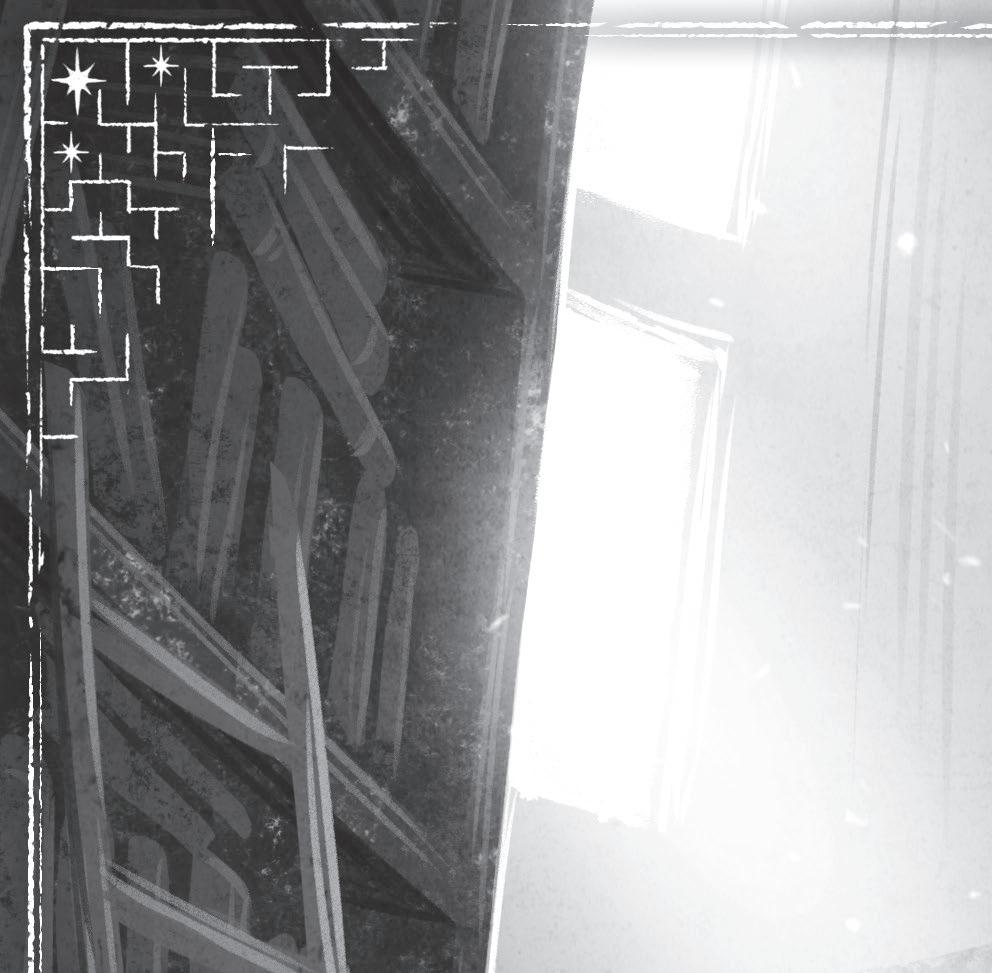
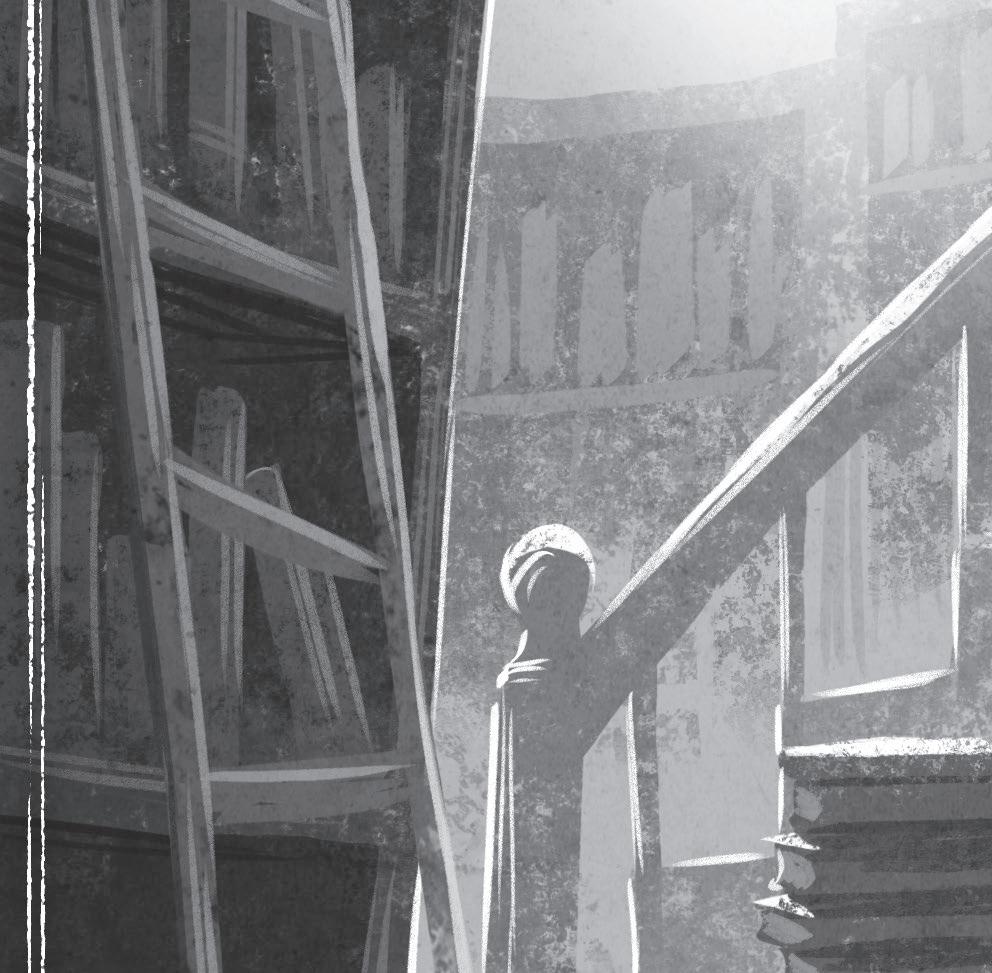
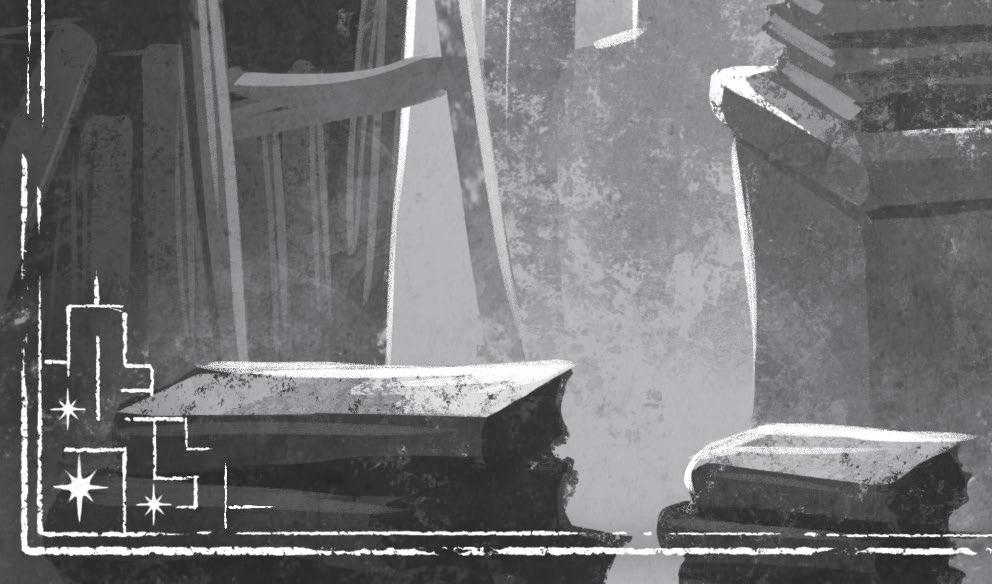
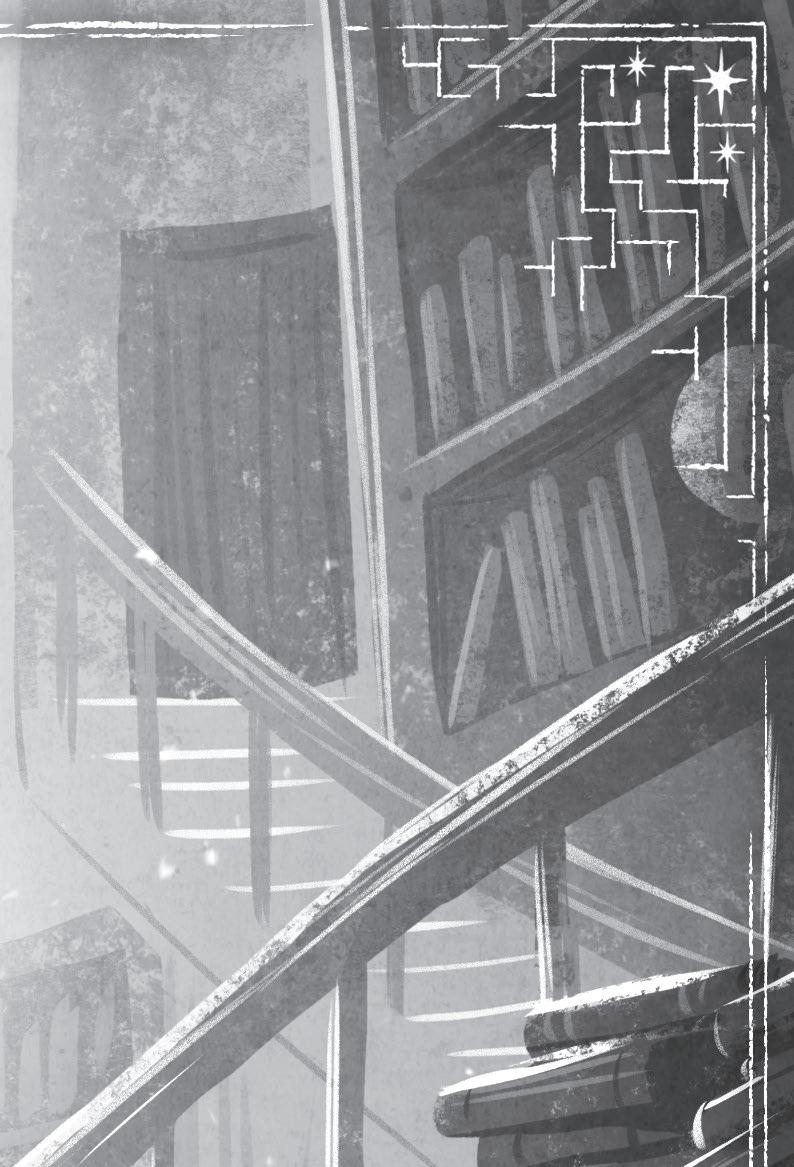
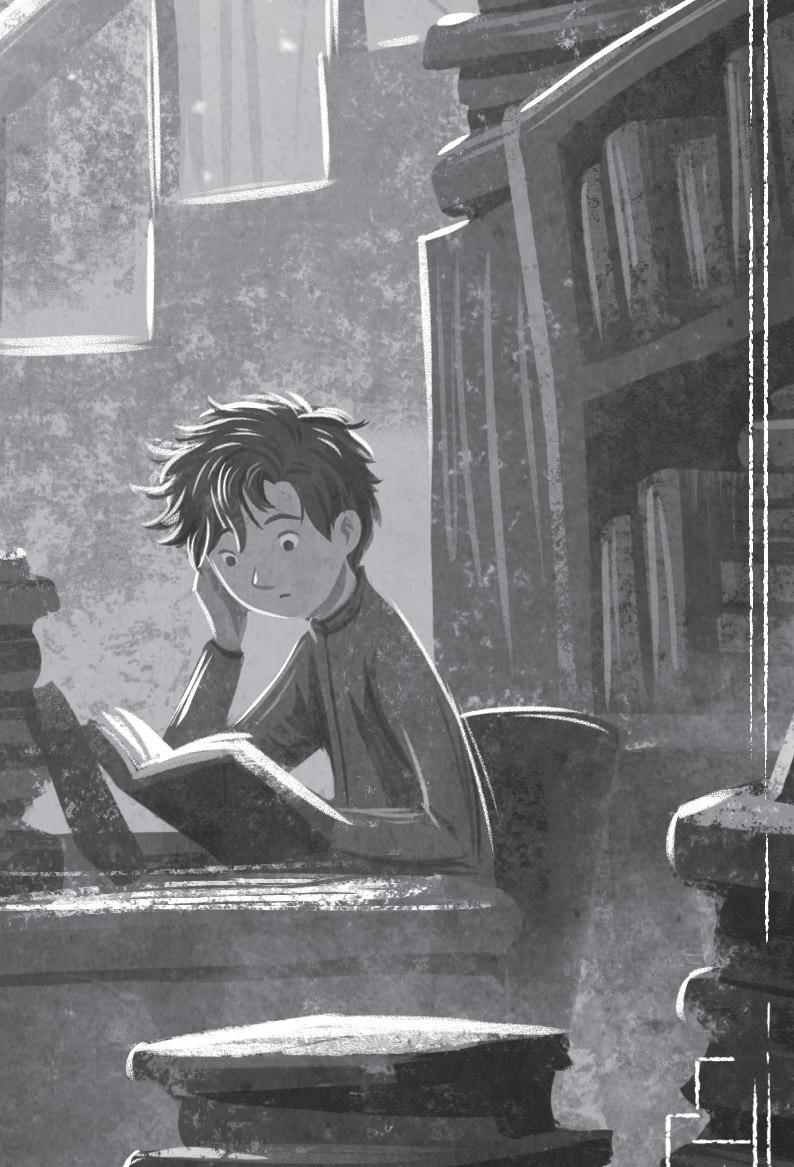

On the first morning of the summer holidays, Mrs Foxglove went into Once Upon A Time and did indeed find Benjamiah behind the counter. He had his nose in a book of chess theory, something of which Mrs Foxglove thoroughly disapproved. She considered chess a waste of time, along with comic books, video games and playing the guitar. Mrs Foxglove tended to disapprove of anything she didn’t understand.
She was a wrinkled, webbed, long-necked busybody who lived in one of the riverside townhouses. Benjamiah was certain she never read any of the books she bought – she only left home to inflict misery.
‘You have a customer,’ said Mrs Foxglove. ‘Perhaps you should put your book down, boy.’
Benjamiah flinched and stood, his book sliding to the floor. Redness bloomed in his cheeks. Mrs Foxglove regarded him with eyes like a snake bite. Standing up hadn’t added much meaningful height to Benjamiah. He was short and thin for his age, and pale from rarely playing outside. He had tufts of mousybrown hair that no brush could tame, and eyes of chestnut brown. From his mum, he had inherited an unlikely nose, jabbing out of the middle of his face and bending inexplicably to the left.
‘What nonsense are you reading today?’ said Mrs Foxglove.
Benjamiah opened his mouth, but Mrs Foxglove gave a dismissive wave of the hand.
‘Shouldn’t you be doing some homework, boy? Or tidying up this messy shop? Let me tell you, in my day . . .’
Benjamiah listened carefully while Mrs Foxglove ranted about the virtues of her day, whenever that was. She continued until her mouth went dry.
‘Where are your parents?’ she snapped when she could think of nothing else to complain about.
‘They’re . . . away,’ said Benjamiah.
‘Away?’ said Mrs Foxglove, licking her lips. ‘Oh yes. I heard all about their little – ah – problems.’
Benjamiah blushed deeper, hot enough to catch fire. It only delighted Mrs Foxglove.
‘Margie from the pottery studio told me they had a big row at the Tom o’ Bedlam on quiz night,’ she continued, her slimy tongue playing over her lips. ‘Getting divorced, are they?’
Benjamiah’s throat had closed up – unable to swallow, unable to speak.
‘I never thought they’d last,’ said Mrs Foxglove. She wetted her lips again. ‘And where’s your grandmother?’
‘She’s upstairs. Resting.’
‘Well, don’t just stand there. Help me find my book. I can’t make out a thing in this mess. It’s a lovely story set on an old
country estate. A love story, but also a mystery novel. It begins with the ghostly sighting of a woman. I read it as a young girl. A real book – not like the guff they publish these days.’
‘What’s the title?’ said Benjamiah, which was a mistake.
‘How should I know!’
‘Sorry,’ he said. ‘What about the author?’
‘Oh, a man,’ said Mrs Foxglove. ‘Definitely a man. Isn’t that enough information? Are you going to just stand there? In my day, customers were treated with . . .’
And so began another rant. It sounded to Benjamiah like The Woman in White, but the suggestion was immediately dismissed. Benjamiah spent the next twenty-five minutes offering books to Mrs Foxglove, only for each to be routinely sniffed at and cast aside.
‘Oh, this is ridiculous,’ she snapped eventually. ‘I’ll just take this one.’
It was The Woman in White, of course. Back at the till, Benjamiah took Mrs Foxglove’s money and handed back her book in a striped paper bag.
‘Have a lovely day,’ he said.
‘Are you trying to be clever?’ said Mrs Foxglove, before stalking out of the shop as if Benjamiah were a bad smell.
The bell chimed and Benjamiah was left in peace. He set about addressing the chaos left in Mrs Foxglove’s wake,
dismantling towers of rejected books and returning them to their shelves.
Benjamiah had been feeling sick for months, and Mrs Foxglove’s comments about Mum and Dad had only made things worse. It was one thing Benjamiah having to know about their marital problems, but did the whole village have to as well? Why did Mum and Dad have to take their battle to the Tom o’ Bedlam when home was already a war zone?
For months, their flat above the bookshop had been a place of slamming doors, the back and forth of bitter accusations, or otherwise soft, sorrowful voices through thin walls, late at night, when his parents thought Benjamiah was sleeping. Life had become a patchwork of resentful silences and explosive arguments, every day ornamented with sighs and puffy eyes, croaky voices and muted sobs. Benjamiah was sick to his back teeth of Mum’s forced cheer, of his dad – before always smiling, always laughing – now glum and stony-faced.
Now they had gone to a cottage in the Purbecks in one final attempt to save their marriage. Like Mrs Foxglove, Benjamiah suspected their differences were the problem. Mum was a professor of astrophysics at the local university, while Dad ran the bookshop. Jim Woodyard came from a family of fanatical readers, mediocre writers, zealous collectors and curators of books and stories, while Zoe Creek favoured interstellar and
extrasolar mysteries, preferring facts and proof over Dad’s fanciful worlds of dragons and warriors and warlocks.
Benjamiah had only two allies while he awaited the outcome of his parents’ trip – Grandma and his books. Grandma was the bedrock, secure and immovable: kind, patient, formidably loving. She was his dad’s mum and the only extended family Benjamiah had.
Books were Benjamiah’s siblings, cousins and friends. Only real books, though, about real things. Benjamiah took firmly after his mum in this regard. For Benjamiah, books were for the accumulation of knowledge. He wanted facts, truths, practical information. Right now, he was reading his book about the Sicilian Defence. Before that, he’d read a tome on Henry VII , and next he had a very exciting book about bridge engineering. That was meaningful reading for Benjamiah – quests to melt rings in distant mountains or slay dragons were a waste of time as far as he was concerned. Benjamiah could tell you the atomic weight of phosphorus or list lots of Jupiter’s moons; he had no interest in green eggs served with ham or the adventures of the Famous Five.
Benjamiah’s books proved Mum and Dad had no excuse. Everything has an answer, every problem a solution. History celebrated those who never gave up, from Darwin to Marie Curie, from Newton to Dorothy Hodgkin. Did the idea of
absolute space and time get in Einstein’s way? No, he threw them out. Did bad weather stop Drake’s campaign against the Spanish in 1577? Of course not. He waited it out, fixed up the galleons and set off again for the Americas. Every problem could be solved if people tried hard enough. His parents would do well to remember that.
He was still tidying up when the bell chimed again.
‘Just coming!’ he called out, but there was no reply. Only silence.
‘Hello?’ said Benjamiah.
He peeked round the corner of a bookshelf, but saw nobody, so threaded his way from room to room. Every section was empty, as was the cellar. Had he imagined the chiming of the bell? Or had a summer breeze pushed the door far enough to set it off? Then he heard a book fall to the ground somewhere in the shop. His heart climbed up his throat.
‘Is somebody there?’ he said, in a thin voice. Nothing. Perhaps Mrs Foxglove had crept back in to frighten him. It seemed the kind of twisted thing she’d do. Not for the first time, he wished the lighting were a little brighter. Still, with his parents away and Grandma resting, Benjamiah had to take charge of the situation. Trembling with the force of his own heartbeat, he inspected every section again, expecting at any moment some terrible rogue to lunge
out and ambush him. He found the book that had fallen – a thick copy of the Bible that had wriggled right off the Sci-Fi and Fantasy shelf. Hands shaking, he put it back.
The bell chimed again, and Benjamiah jumped out of his skin.
‘Grandma?’ he called.
Yet again, there was no reply. Silence hung heavy in every direction. He crept back to the door, looked out on to the street, then returned to the till, feeling thoroughly spooked.
There he found a parcel on the counter, addressed to him. It must have been the postwoman all along. Why was she sneaking around like that? He’d always thought she was an oddball. But fear was giving way to reluctant excitement. Nobody ever sent him anything. It could only have been from his parents, though it would take more than a gift to bring him onside. He wanted his family to remain whole. That was the present he most wanted.
It was an oddly shaped parcel, clumsily wrapped and lighter than he’d hoped. Strangely, Benjamiah could find neither an address nor a stamp on the shabby packaging. Surely Mum and Dad could wrap a gift better than this?
‘What have you got there?’ said a voice.
For the third time in quick succession, Benjamiah flinched. But it was only Grandma this time, shuffling down the stairs. She was short and squat with curly grey hair and magnificent tortoiseshell glasses, lending her hazel eyes a bulbous and
wobbly quality. Forever cold, she was a matryoshka doll of cardigans – one each in mauve, blue and mustard today.
‘A package,’ said Benjamiah, showing her. ‘For me.’
‘Ah, must be from Mum and Dad,’ said Grandma, frowning. ‘Well, let’s see it.’
Benjamiah tore through the thick brown paper. The candle of excitement was snuffed out the instant he saw what was inside. It was a floppy doll of red, leather-like fabric, with a tuft of black string for hair and two big white buttons for eyes. It had no other facial features, no hands, no feet – just little leathery arms and legs ending in nubs. He held it up and watched its head loll miserably to one side.
‘How odd,’ said Grandma.
‘A doll,’ said Benjamiah. ‘Why would they send me a doll ?’
‘It isn’t just a doll,’ said Grandma. ‘It looks like a poppet. A doll used for witchcraft. Is there a note with it?’
Benjamiah explored the torn packaging, but found nothing. Witchcraft? This had Dad’s fingerprints all over it. It was just the kind of thing he’d find interesting.
‘Well, I think it’s fascinating,’ said Grandma.
‘You have it, then,’ said Benjamiah, his fury spilling over. He slapped the poppet down on the counter and stormed past Grandma, up the stairs and into his room. To drive home his point, he slammed the door.

Much as I have tried, I have never found proof of this other world. If such a place exists, only a chosen few have ever travelled between the two. For the people of Wreathenwold, our entire world is this labyrinth, sprawling forever – where straying too far from home can mean never finding it again.

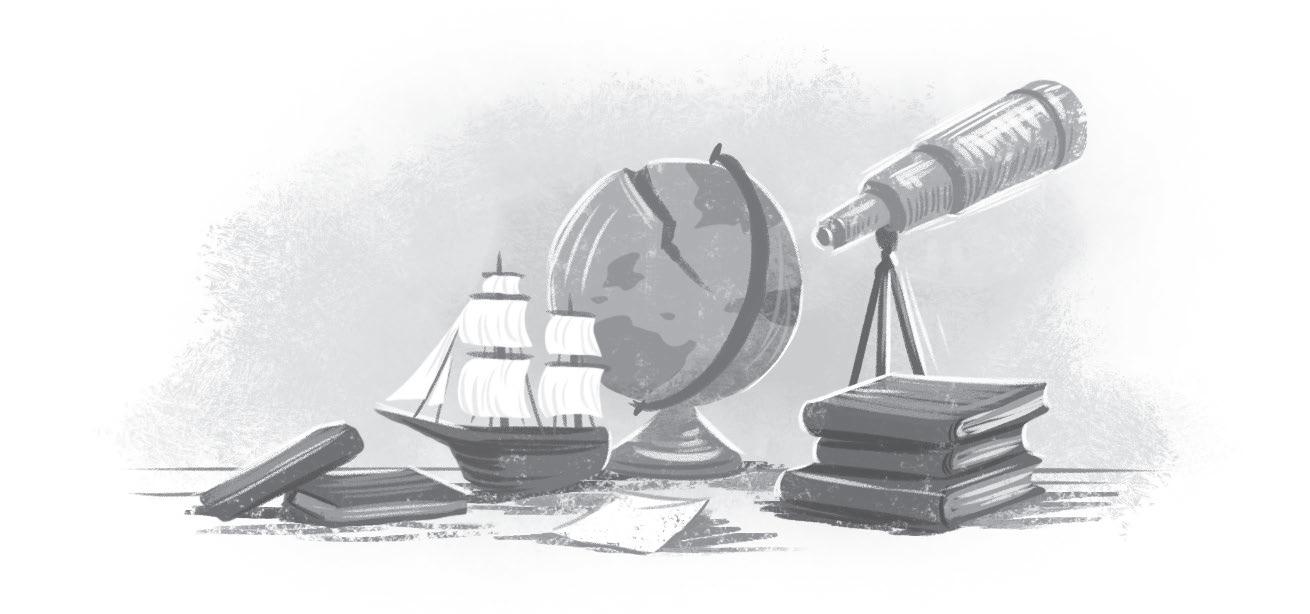
THREE



Adoll. A doll! He would expect it of Dad, but why had Mum allowed it? She knew him better than that. They could have sent him a book, a puzzle, a model ship or aeroplane – none of which would have made him forget about their collapsing marriage, but at least he wouldn’t feel insulted. Needless to say, Benjamiah had no appreciation for creepy, unsmiling dolls that had something to do with magic – which he knew very well didn’t exist. Magic was what people in the past called physical phenomena they didn’t understand. He threw himself down on his bed, stewing and sulking with his arms crossed. His room was testament to the character his parents had offended, evidence of the enlightened world that had left magic behind. Benjamiah had certainly inherited his mother’s
fascination with science. Star charts were plastered on the walls, and by the window was a second-hand telescope. Grandad’s old globe, a crack across South America, dominated the bedside table. On his desk were the odds and ends of various projects – an orrery he hoped to repair, bought from the bric-a-brac shop nearby, a half-built model pirate ship surrounded by blobs of glue and tangles of excess rigging. Imposing books were crammed and stacked on every shelf, on his bedside cabinet, piled up in his wardrobe. Books on biology, history, mathematical problems. The room was Lshaped with a sloping ceiling and a narrow bed with dark blue bedding, scattered with stars.
There was a knock on the door. To further express his dissatisfaction, he punched air out of his nose like a snorting bull – something he’d learned from Mum.
Grandma opened the door and poked her head round it.
‘There’s no need for that,’ she said, eyes narrowing.
In she sidled. She’d brought the doll with her. Benjamiah snorted again, then rolled on to his side, showing Grandma his back. The mattress sank as she perched on the bed.
‘Ben,’ said Grandma. ‘Look at me.’
‘No.’
Grandma sighed. She patted him on the arm.
‘I’ve never known you to be ungrateful,’ she said.
‘I don’t want a doll,’ said Benjamiah. Grandma, after a careful pause, said, ‘What do you want?’
Benjamiah was silent, stubborn.
‘It’s okay to talk,’ she said. Silence.
‘Talking isn’t a weakness,’ continued Grandma. Silence.
‘And nor is being scared,’ she added.
A tiny fidget was Benjamiah’s only response. Grandma put a hand on his arm.
‘Would you like to talk?’
‘No.’
‘Well, you know where I am if you change your mind,’ she said. ‘I’m worried about you, Ben.’
‘Worry about them.’
‘I’m worried about Mum and Dad, too, but they’re grown-ups.’
‘Tell them to act like it,’ replied Benjamiah.
Without siblings, Benjamiah’s world was a small and fragile arrangement, like the orrery on his desk. His life was Mum, Dad, Grandma, his books, his models, the bookshop. Now it was threatening to collapse, and – unlike the orrery – it was beyond his power to repair. It was up to Mum and Dad. Why couldn’t they try harder?